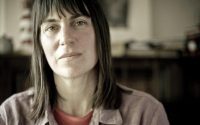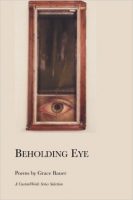July 7, 2016
Edited by David Sanders
Specimen Days
1771—Thomas Gray, English poet (Elegy), dies at 54.
1893—Vladimir Mayakovsky, Soviet Georgia, poet (Ode to Revolution)[NS=7/19], is born.
1907—Helene Johnson, poet, is born.
1915—Margaret Walker Alexander, poet/novelist (For My People), is born.
1929—Hasan Abidi, Pakistani journalist and poet (d. 2005), is born.

Give me the white road glistening,
A strand of pale moon's hair,
And the tall hemlocks towering,
Dark as the moon is fair.
Oh what do I care for the mornin,
Naked and newly born—
Night is here, yielding and tender—
What do I care for dawn!
—from “What Do I Care for Morning” by Helene Johnson (1906-1995)
“Give me the white road glistening, / A strand of pale moon’s hair, / And the tall hemlocks towering, / Dark as the moon is fair.” —Helene Johnson
World Poetry
French Poet Yves Bonnefoy Dead at 93

The prolific writer, essayist and poet, who composed more than 100 books over his long career, was often tipped as favourite to win the Nobel prize for literature. Famous in Italy, Germany and Switzerland but also throughout the English-speaking world, Bonnefoy also produced translations of the works of Yeats, Petrarch and his friend George Seferis, a celebrated Greek poet. He died on Friday, according to the College de France research and education institute where he was an honorary professor.
Rumi Wasn't Yours: Afghan Fury as Iran, Turkey Claim Sufi Poet
Who can lay claim to Rumi, the Sufi mystic who is one of the world’s most beloved poets? A bid by Iran and Turkey to do so has exasperated Afghanistan, country of his birth eight centuries ago. Tehran and Ankara asked to list the work of Jalal ud-Din Muhammad Rumi as their joint heritage on the UN’s “Memory of the World” register in May. The register, falling under the UN’s cultural organisation UNESCO, was formed in 1997 to protect the world’s documentary heritage – archives, correspondence and writing – especially in troubled or conflict-ridden areas.
French Poet Yves Bonnefoy passed away at age 93.
Recent Reviews
Pablo Neruda’s Lost Poems Have Been Published, But Perhaps They Should Have Stayed Lost
by Sridala Swami
Let me begin with a confession: like any post-adolescent of the late 1980s with literary pretensions, I adored Pablo Neruda’s poems. I had recently read Gabriel Garcia Marquez’s One Hundred Years of Solitude and was preparing to remain on the continent one way or another, via Paz, Borges and Neruda. Those love poems! Those humid, earthy exhalations of fervour! All that spring, all those cherry trees.
Craig Raine: the Critics’ Greatest Critic
by Julian Stannard
Craig Raine is a pugnacious figure in the fractious world of contemporary poetry. When his poem ‘Gatwick’ appeared in the LRB (2015), social media had one of its habitual spasms. Here was a piece which indulged the male gaze and celebrated lustful yearning — an older man for a younger woman. Hardly new ground one might have thought; but to be fair it’s actually rather more subtle than that, and Faber’s former poetry editor responded to the howls of protest by saying: ‘Of course the stupid are always with us.’
Is Alice Oswald Our Greatest Living Poet?
by Charlotte Runcie

'I want to work out what it’s like to descend/ out of the dawn’s mind/ and find a leaf and fasten the known to the unknown/ with a liquid cufflink/ and then unfasten”. Magic, the music of nature, the resurrection of the dead: all these things feel real when you read Alice Oswald.
Magic, the music of nature, the resurrection of the dead: all these things feel real when you read Alice Oswald.
Broadsides
Essay: To Be a Dancing Bear
by Tom Sleigh
Imagine that you are seven years old, at an upstairs window in your attached flat in Brockley, south-east London, and down below in the street you see a dancing bear. The bear is standing upright, and there is a leather muzzle over its jaws, which is attached to the back of its head by a strap that loops around its ears. And now imagine that you are the bear: your paws are held out, your claws flexed, and on your face is the bewildered look of a child who is trying to please an adult, but doesn’t quite know what the adult wants.
Over at the Poetry Society, Tom Sleigh wrote a brief essay on David Jones’s animal drawings.
Drafts & Fragments
Were These Poems Written by Machines or Humans?
by Sage Lazzaro
Teaching computers to understand and mimic natural language is one of the biggest challenges in computer science and artificial intelligence. So can a computer write a poem indistinguishable from one penned by an actual human? Computer scientists at Dartmouth College wanted to find out, so they gathered sonnets written by computers and others by actual authors and put them to the test. Robert Siegel, host of NPR’s All Things Considered, served as one of the competition’s judges, and he reports that no one was fooled.
Why Twitter's "Poet Laureate" Has No Plans to Unmask His Real Identity
by Franz Lidz
Back in the day, when J.R.R. Tolkien and C.S. Lewis pub-crawled through Oxford, the taproom at the Eagle and Child was so dark and smoky you could bring a rhinoceros in and nobody would notice unless it offered an untoward literary opinion. But on a recent spring night, the joint is bright, the air is clear and the mysterious Brian Bilston, a literary light of considerable wattage, nurses a pint of Hobgoblin Gold, unrecognized and happily anonymous.
Twitter’s “Poet Laureate” has no plans to unmask his real identity.
Poetry In the News
Geoffrey Hill, 'One of the greatest English poets', Dies Aged 84

Geoffrey Hill, a poet regularly hailed as the greatest in the English language, died suddenly on 30 June at the age of 84. Hill’s wife, the librettist Alice Goodman, announced his death on Twitter. “Please pray for the repose of the soul of my husband, Geoffrey Hill, who died yesterday evening, suddenly, and without pain or dread,” she wrote. Emmanuel College in Cambridge, where Hill was an honorary fellow, confirmed the news.
Gov. Nixon Appoints Aliki Barnstone as New Missouri Poet Laureate

Aliki Barnstone is Missouri’s new poet laureate, Gov. Jay Nixon’s office announced Thursday. A creative writing and English professor at the University of Missouri-Columbia, she is the state’s fourth poet laureate and its first woman appointed to the post. Her eighth collection of poetry, “Dwelling,” is scheduled for publication this fall.
Aliki Barnstone is Missouri’s new poet laureate, Gov. Jay Nixon’s office announced Thursday.
New Books
Look: Poems by Solmaz Sharif
[Paperback] Graywolf Press, 96 pp., $16.00

Solmaz Sharif's astonishing first book, Look, asks us to see the ongoing costs of war as the unbearable loss of human lives and also the insidious abuses against our everyday speech. In this virtuosic array of poems, lists, shards, and sequences, Sharif assembles her family's and her own fragmented narratives in the aftermath of warfare. Those repercussions echo into the present day, in the grief for those killed in America's invasions of Afghanistan and Iraq, and in the discrimination endured at the checkpoints of daily encounter.
Beyond the Barbed Wire: Selected Poems by Abdellatif Laabi
[Paperback] Carcanet Press, 224 pp., $14.99
A career-spanning selection of Laabi's poetry from the late 1960s to the 2010s, with a special emphasis on his prison writings from the 1970s. The book also features an extensive interview with the author, which discusses his renewed prominence on the Moroccan intellectual scene after the Arab Spring, once a new generation of artists and activists began looking to him as a source of inspiration.
Speak from Here to There by Kwame Dawes and John Kinsella
[Paperback] Peepal Tree Press,132 pp., $18.95

For six months during 2015, two poets known for their capacity to create lyric responses to the complex realities around them, yet poets fully inscribed in both a western literary tradition and other longer traditions that have been marginalized, exchanged poems that were in constant dialogue even as they remained wholly defined and shaped by the details of their own private and public lives. Kwame Dawes’ base was flat prairieland of Lincoln, Nebraska, a mid-American landscape in which he, a black man, felt at once alien and curiously committed to the challenges of finding “home”; and John Kinsella’s base was in the wide open violently beautiful landscape of western Australia, his home ground, thick with memory and heavy with the language of ecological change, political ineptitude and artistic defiance. E-mail was the bridge. These two poets found themselves in the middle of the swirl of political and social upheavals in their spheres
The Borrowed World by Emily Leithauser
[Paperback] Able Muse Press, 84 pp., $18.95
In "The Borrowed World, "Emily Leithauser transforms keenly felt experience and bittersweet memories into poems of impressive craftsmanship. She deftly muses on the dichotomies of, among other things, childhood and growing up, the headiness of love gained and the pangs of love lost, the joys of the nuclear family and the trials when it gets broken up. Although a first book, "The Borrowed World" is the seasoned work of poet of abundant talent coming into her powers and deservedly, the winner of the 2015 Able Muse Book Award
Beholding Eye by Grace Bauer
[Paperback] WordTech Communications, 112 pp., $17.00

Grace Bauer … deploys the voices of artists and their subjects to consider matters of identity, power, class, anger, and erotics. With her usual high wit, the poet revises the location and meaning of worth and beauty. Bauer's formal skill serves to illuminate the "thick and pungent" paint caked on the hands of the maker, as well as the "civility and containment" we must shun to enter A-R-T." —Hilda Raz
For six months during 2015, Kwame Dawes and John Kinsella exchanged poems that were in constant dialogue.
Correspondences
A Decade after Prison, a Poet Studies for the Bar Exam
by Elisa Gonzalez
Reginald Dwayne Betts has wanted to be a lawyer for almost as long as he has wanted to be a poet. “Poetry and law have always been intertwined in my mind,” he said recently, “in part because poetry gives me the language to pretend that I can answer questions, even if I can’t.” We were in New Haven, Connecticut, and Betts was three days from his Yale Law School graduation.
The Hatred of Poetry: An Interview with Ben Lerner
by Michael Clune
What do we want from poetry? To read a poem is, on some level, to loathe it—both poem and poet aspire to fulfill a set of impossible expectations from the culture. In his new book, The Hatred of Poetry, Ben Lerner argues that a disdain for poetry is inextricable from the art form itself. Earlier this month, Michael Clune spoke to Lerner at Greenlight Books, in Brooklyn. The exchange below is an edited version of that conversation. — [Paris Review] Ed.
Christopher Kondrich and Tracy K. Smith: Our Best Selves Are Reserved for The Page
I came to the work of Tracy K. Smith through celestial doors, through Life on Mars and her evocation of great works of science fiction. I remember gravitating toward her references to Kubrick and Arthur C. Clarke, toward her celebration of David Bowie, and toward a shared wonder and reverence for the cosmic. The brilliant poems in Life on Mars, which won the Pulitzer Prize for Poetry, sent me careering backwards to her first collections: The Body’s Question (2003), which won the Cave Canem Prize, and Duende (2007), which won the James Laughlin Award. Then, it seemed almost immediately to me, her work was everywhere.
Michael Clune and Ben Lerner on “The Hatred of Poetry.”